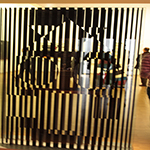Euroacademia Conferences
 Europe Inside-Out: Europe and Europeanness Exposed to Plural Observers (9th Edition) April 24 - 25, 2020
Europe Inside-Out: Europe and Europeanness Exposed to Plural Observers (9th Edition) April 24 - 25, 2020 Identities and Identifications: Politicized Uses of Collective Identities (9th Edition) June 12 - 13, 2020
Identities and Identifications: Politicized Uses of Collective Identities (9th Edition) June 12 - 13, 2020 8th Forum of Critical Studies: Asking Big Questions Again January 24 - 25, 2020
8th Forum of Critical Studies: Asking Big Questions Again January 24 - 25, 2020 Re-Inventing Eastern Europe (7th Edition) December 13 - 14, 2019
Re-Inventing Eastern Europe (7th Edition) December 13 - 14, 2019 The European Union and the Politicization of Europe (8th Edition) October 25 - 26, 2019
The European Union and the Politicization of Europe (8th Edition) October 25 - 26, 2019 Identities and Identifications: Politicized Uses of Collective Identities (8th Edition) June 28 - 29, 2019
Identities and Identifications: Politicized Uses of Collective Identities (8th Edition) June 28 - 29, 2019 The European Union and the Politicization of Europe (7th Edition) January 25 - 26, 2019
The European Union and the Politicization of Europe (7th Edition) January 25 - 26, 2019 7th Forum of Critical Studies: Asking Big Questions Again November 23 - 24, 2018
7th Forum of Critical Studies: Asking Big Questions Again November 23 - 24, 2018 Europe Inside-Out: Europe and Europeanness Exposed to Plural Observers (8th Edition) September 28 - 30, 2018
Europe Inside-Out: Europe and Europeanness Exposed to Plural Observers (8th Edition) September 28 - 30, 2018 Identities and Identifications: Politicized Uses of Collective Identities (7th Edition) June 14 - 15, 2018
Identities and Identifications: Politicized Uses of Collective Identities (7th Edition) June 14 - 15, 2018
Citizens Without Names: What is the Impact of the Runevič – Vardyn Litigation on European Integration in Poland and Lithuania?
-
-

-
Presentation speakers
- Egle Dagilyte, Bucks New University, UK
- Panagiotis Stasinopoulos, King’s College London, UK
Abstract:
The paper deals with a particular ‘breed’ of free movement cases, where the national rules on spelling of EU citizens’ names may constitute an obstacle to exercising free movement rights, such as Konstantinidis and Sayn – Wittgenstein. Runevič Vardyn continues this line of cases in the EU -28, highlighting the differences of personal identity and minority rights in the Eastern European Member States. Mrs Malgožata Runevič -Vardyn (a Lithuanian national member of the Polish minority in Lithuania) requested her name be spelt using the Polish alphabet on her Lithuanian marriage certificate, because the Lithuanian spelling infringed Mrs Runevič – Vardyn’s EU free movement rights and the right to be treated equally. The case caused considerable public debate both in Lithuania and in Poland, two neighbouring Member States which joined the Union in 2004 and which share close historical and cultural roots, as well as political disagreements. The paper first puts the Runevič – Vardyn litigation in its legal and political context, while the second part aims to look beyond the outcome of the judgment, assessing the importance of the Runevič – Vardyn judgment to Polish – Lithuanian relations, and the challenges they may pose for the future of European integration. The authors argue that the Court in this case had the difficult task of finding a balance between EU citizens’ fundamental rights and national constitutional traditions, which is particularly pertinent in the case of Eastern European Member States with their unique constitutional developments. The last part of this paper shall thus seek to establish how EU law can overcome the challenges posed by Eastern Europe’s different constitutional realities by focusing on EU citizenship and its potential role as a catalyst for integration. -
Related Presentations

New Challenges of the Western Balkan Countries and Turkey on the Way to European Union
- Ivana Božić Miljković

















